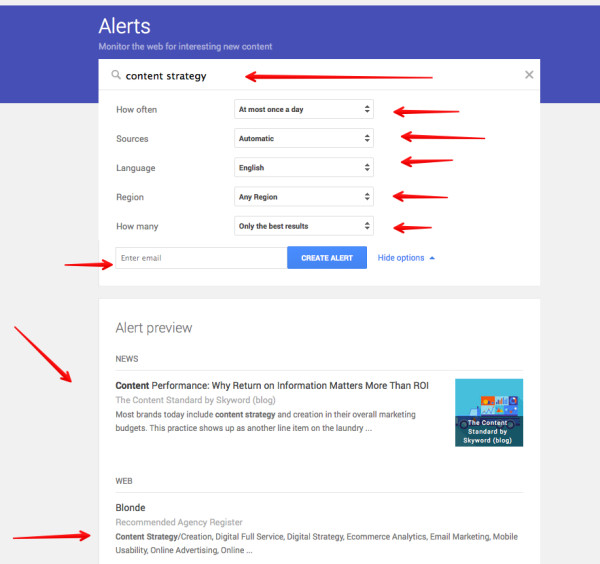Google alerts are a brands best friend for monitoring topics relating to your business, tracking what your competitors are doing and a front end source of curated news.
Think of this services as much more than a Swiss Army Knife for monitoring news.
You can use it to front end load an Editorial Calender, generate ideas for your blog, news source for sharing content via Twitter and Facebook.
Setting up an alert can be done in under two minutes
Identify your keyword or phrase for monitoring and reporting. The more specific the better.
- Google gives you Dropdowns for Selecting
- How Often: As it Happens, Once Per Day or Week
- Language
- Region (which really functions as a country)
- Only Best Results with a broader “All the Results
- You’ll even get a prevent snippet at the front end of the process after you’ve plugged in a phrase at the top of the form
- Add your email address and you’re good to go and expect inbound alerts with the frequency you set up.
- Remember you are getting a fire hose feed of news that is filtered by the phrase you are using. It takes some skill to review the data and interpret it.
- This data is somewhat raw and unrefined; so exclusion terms may be needed for broad topics: “San Francisco organic food providers – Alice Waters” (excluding Alice Waters)
- You can also track whats being said via other sites like Google Plus with this structure as an example: site.Plus.Google.com “Name of your Biz in Quotations”
- Set up an alert for a client (company or individual) you are about to work with to get a 30K foot picture of the company.
- Quotation marks limit your search to specific terms.
- If you add an * at the end of the search term Google will broader the search out to other relevant topics.
Google Alerts are a Great Tool for Monitoring your Brand
I’d recommend setting up these kinds of Alerts for your business:
- Formal name of your business and any variances (separate alert for each) that others may be using.
- The branded Names of your Products or Services.
- Topics that map to the local area you are in that might be newsworthy: “best pizza in San Francisco”
- Personal names of all of your key execs, BOD members, individuals speaking at conferences or tradeshows.
- Questions being asked that may identify an opportunity for a blog post or to address and position your business as a thought leader.
Staying on top of your direct competitors
- Group these by direct competitor of course with this subset below.
- Name of the competitor,
- Their Product or Service Names.
- Key phrases or hashtags they may be using for branding purposes.
- Their stock symbol if public, which will give you broader news about them.
- Names of their key executives, product managers (if bigger company) or others who are actively speaking at conferences.
Industry News and Trends
- Who are thought leaders in your biz. You can also correlate and/or triangulate if you will people you have created lists for via Twitter and Tweetdeck.
- Topics (seasonal, local, national) that are occurring in your industry.
- Networking events. LinkedIn Groups are a good source for names of events.
- Use a search phrase and Site: www.XXX.com
Critical Takeaways for Smartphone in Hand Execs
Google alerts almost died during the last 2-3 years but after a strident hue and cry across the social web Google pumped resources back into the services.
Your getting a fire hose of information so you will need to adjust what your pulling back with exclusions or specific terms and may also want to adjust the frequency.
Google Alerts are a great way as mentioned earlier to use as a source for an Editorial Calender (that link has a downloadable Execl format sample).
Yahoo offers an alternative and their are paid applications services like Mention, which is Google Alerts on Steroids and it may be worth a trial.
Consider using Twitter on Tweetdeck as an alternative or in combination with Google Alerts.
Tweetdeck enables you to set up column feeds based on keywords, lists you have created and hasthags.
Google Alerts coupled with Twitter notifications will give you broad coverage of topics, competitors, industry trends and much more.
